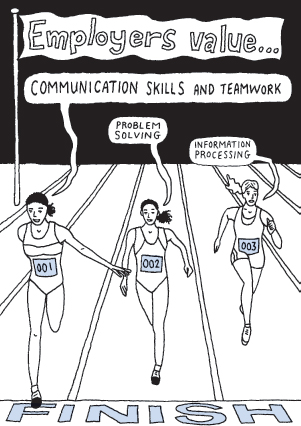Using Public Speaking in Your Career
Printed Page 10

A knack for public speaking is one of the most important assets you can possess in the workplace. According to the National Association of Colleges and Employers 2012 Job Outlook Survey, verbal communication skills and ability to work in a team outrank all other qualities that employers seek in potential job candidates.7 Employees agree that communication skills are important. In the survey “Making the Grade? What American Workers Think Should Be Done to Improve Education,” 87 percent of the 1,014 U.S. adult workers surveyed rated communication skills as very important for performing their jobs.8
The importance of public speaking is not limited to careers that might first come to mind, such as law or politics. In Listen. Write. Present, a book on effective communication in scientific and technical fields, authors Stephanie Roberson Barnard and Deborah St. James emphasize that workers in these careers need to practice public speaking so that they will be comfortable when presenting and able to tailor their presentations to audience needs.9 No matter which career path you choose, you’ll almost certainly need public speaking skills. Consider the following examples:
- A police officer faces an angry crowd on the verge of violence. The officer talks calmly and rationally to the group, defusing the tension and preventing a brawl.
- An IT professional shows peers a new workflow program the company is developing and addresses the bugs the IT team is working to fix.
- An elementary school teacher encounters a roomful of parents who are skeptical about a new math curriculum, which differs markedly from how they learned math in “the good old days.” The teacher clearly and energetically presents research results defending the curriculum, and the parents happily accept the new method.
Hall of Famer Lou Gehrig did not choose career paths that made public speaking likely, as he was planning to major in engineering at Columbia before the Yankees came calling. Nevertheless, he delivered one of the most compelling presentations in American history. After being tragically stricken with ALS, he was honored in a ceremony at Yankee Stadium. His eloquent remarks, sometimes called the “Gettysburg Address of baseball,”10 are perhaps even more memorable than his four Most Valuable Player awards.
Click the "Next" button to try Video Activity 1.1, “Gehrig, Farewell Address.”